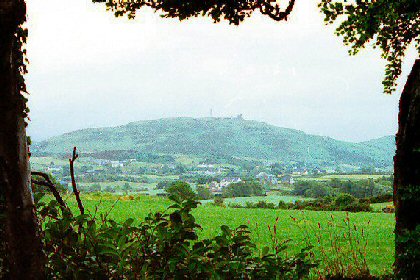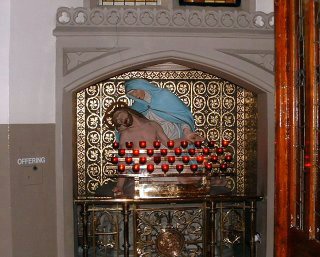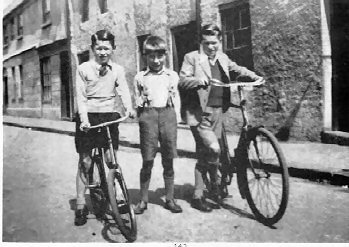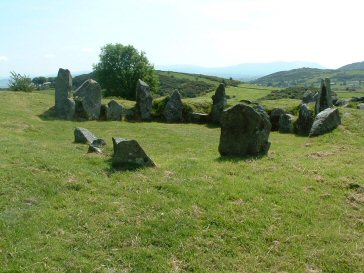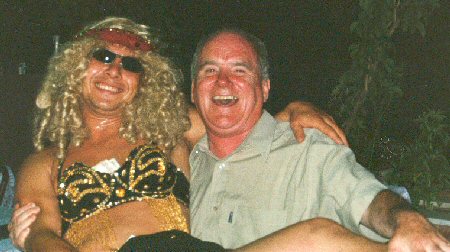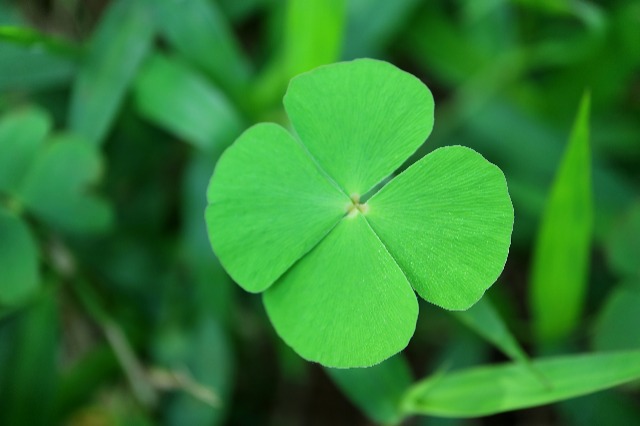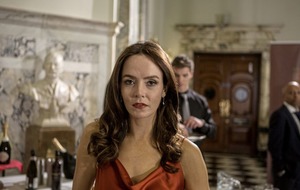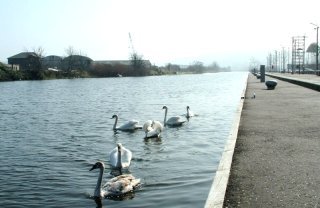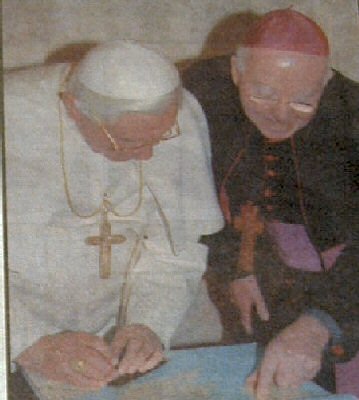When Eddie Maguire first got the job of digging graves and tending the lawns up in the cemetery, he was more than content to be well off-side from snooping Dole men, busybody neighbours and sarcastic so-called ‘mates’.
Culture
Local Parlance
In the wake of the culvert explosion near his home, the Cross’ man was admitted to Daisy Hill Hospital for observation.
‘Did your bowels move yet?’ the staff nurse asked solicitously.
‘Bouls, is it?’ he roared.
‘Amn’t I tellin’ ye, the whole effin’ dresser came crashing to the flure?’
He thought she was referring to the breakfast crockery.
…
Street Rhymes
Skipping, hop-scotch and juggling up to three balls against a wall were the exclusive pursuits of young girls in my day. All were accompanied by rhymes either short or long. I was envious that this ‘poetry’ was not for us boys, and gob-smacked that every girl knew them all by heart. I would be delighted if any older ‘girl’ who remembers those I do not, would contact the Journal with their words! Below are just a few that I do recall.
When I was young I had no sense
I bought a fiddle for eighteen pence
But the only tune that I could play
Was ‘Over the hills and far away’.
Healing Heather Wine
Phrases explained again
Pewter, a soft metal amalgam which reacts with some acids was often in times past used for making plates and drinking vessels.
Irish Lucky Charms – Why and How
There are many lucky charms and symbols that are related to the Irish and are considered lucky. Many of these Irish lucky charms have historical significance, and many are simply based on myth, legend, or folk tales. Here’s a good way to get an idea of the mythical and cultural history of the Irish and their luck (and also have a good laugh): If you have never seen the movie ‘Darby O Gill and The Little People’ – you need to sit down and watch it to get sucked in to the magic and tales of Irish folklore and fairies.. and of course the luckiest battle of wit you will ever see!
Any true believer in Irish Folklore will inform you that catching a leprechaun fairy (leprechauns are members of the Fairy Folk) will bring good luck. If you can hold on to him tight enough, and technically hold him hostage for long enough, the leprechaun will grant you three wishes in exchange for his freedom. The mischievous little green man is also well known to hide his pot of gold at the end of rainbows, so if you’re lucky enough to get to the end of the rainbow, finders keepers.. eh?.
History of Irish Good Luck Charms
According to the book “The Element Encyclopedia of Magical Creatures,” by John and Caitlin Matthews, the legend of the leprachaun can be traced back to eighth-century tales of water spirits called “luchorpán,” meaning small body, according to John and Caitlin Matthews book the legend eventually evolved into a mischievous household fairy said to appear in cellars, play tricks on people, and drink heavily. Like any good Irish man or woman, right? Although a mascot of Ireland and supposed bringer of luck in the form of gold and wishes, the leprechaun is not the only symbol or charm in Irish tradition.
Four Leafed clover
Four-leaf clovers are a rare find, and were used as magical charms by Celtic priests who believed the little gem would protect them against evil spirits. The Celts believed that four-leaf clovers would allow them to be able to see mischievous fairies, and dodge their shenanigans, which were viewed as unlucky. And you would understand why if you had experienced the little menaces as many an Irish man has – just ask Darby O’Gill! They are to this day still believed to have magical powers including luck, hope, love, and faith. Four-leaf clovers are incredibly rare, which is one of the things that leads to them being seen as so lucky.
A Lucky Penny
As long as you have a penny in your pocket you are never broke! The idea of a lucky penny is “a small sum given back ‘for luck’ to the purchaser or payer by the person who receives money in a bargain or other transaction,”. In It is still a tradition to some Irish people to give a luck penny in some instances like buying a new home, or your granny will always pop a lucky penny in the new purse she buys you for Christmas. Not so nice when she puts one in the mix of her yummy fudge and forgets to tell you! Giving a Luck Penny originates back to an old Irish tradition originally associated with the buying and selling of farm animals. After buyer and seller agree their deal, it is sealed by each spitting into the palm of their hands, and closed with a lovely firm handshake.
Now, the seller must immediately give back the buyer a gift of a sum of money for “Good Luck”. This is an important ritual because failure to give back a Luck Penny could bring ill fortune to them both. Traditionally, (and you couldn’t break tradition now, could you?) both buyer and seller then head to the local pub where the “Lucky Penny” is used to buy the first round of celebratory drinks for them both.
In the days when a penny had a lot more value, the “Luck Penny” was just that, a penny. These days the “Luck Penny” gift is more of a token than of any real monetary value. Nevertheless, the tradition of referring to this gift of cash as a “Luck Penny” remains.
Horseshoe
Horseshoe charms are one of the hugely popular good luck charms popular throughout Ireland. Again, there’s a fairy link here – horseshoes were made of iron, which fairies cannot stand, so it was important for warding off their mischief. There’s another legend about Saint Dunstan, a blacksmith who was ordered by the devil to shoe his horse. Instead, he nailed the shoe to the devil’s foot only removing it after the devil promised to stay away from any home with a horseshoe. Hence, displaying a horseshoe in the house is considered to be lucky for warding off evil.
Luck of the Irish
‘Irish luck’ might seem like a strangely pervasive term in light of a nation that has experienced a devastating potato famine, generations of English oppression, and a history of relentless rain. Nonetheless, Ireland is imagined by many as a nation brimming with lucky gold coins and shamrock charms.
The phrase, ‘luck of the Irish’ is commonly thought to mean “extreme good fortune.” However, according to Edward T. O’Donnell, an Associate Professor of History at Holy Cross College and author of “1001 Things Everyone Should Know About Irish American History”, the term has not an Irish origin but in fact an American one.
During the gold and silver rush ears in the 19th century, some of the Irish miners (or of Irish American descent) made great fortunes. Over time this association of the Irish with mining fortunes led to the development of the expression ‘luck of the Irish’. Of course, it carried with it a certain tone of sarcasm, with an undertone of the idea that, only by sheer luck, and not brain power, could these eejits succeed.
Many suggest the phrase stuck around in part because of the note of irony attached to it, considering how actually, the Irish have actually been pretty unlucky throughout history – from the ruthless pillaging of the Vikings, to families pulled apart by emigration, death and famine, and today’s prevailing discrimination against redheads. But despite this, and partially fueled by the fact that thee Irish have suffered their fair share of ill fate, they have developed a dark sense of humour.
Needless to say, Ireland’s folklore is embellished with luck, even if its factual history is not. Ireland is a luscious and welcoming country full of cosy pubs, friendly faces, beautifully haunting music and gorgeous moors of emerald green.
With an incredible heritage of which to be proud, and a global significance of which to be proud – it seems that the Irish are a little lucky after all. And that is most definitely worth a toast and a singsong over a pint of Guinness on St Patrick’s Day!
So in the words of the Fairy King according to Darby O Gill himself;
‘Tis more than your wish was. Nayther you nor anyone who sits at your table, through all your life, will ever want a bite to ate or a sup to drink, nor yet a silver shilling to cheer him on his way. Good luck to all here and goodbye!”
Famous Irish actress Valene Kane The Fall is well known for her love of lucky charms as well!
Leprechaun Good Luck Charm
Some Irish people still see the leprechaun as a good luck charm. Leprechauns are not real, but they do come from popular Irish folklore. These small people were the shoemakers who took what they made from making shoes and put them in a pot at the end of a rainbow.
People often times look for leprechauns to try and get them to give away a piece of gold, but also because leprechauns are supposed to be good luck!
Valene Kane
Best-known for playing kidnap victim Rose Stagg in The Fall, Newry-born actress Valene Kane holds all the power in her latest role as an ‘alpha female’ barrister in legal drama Counsel. This drew her back to Northern Ireland for the pilot project and she has hopes of it being made into a series.
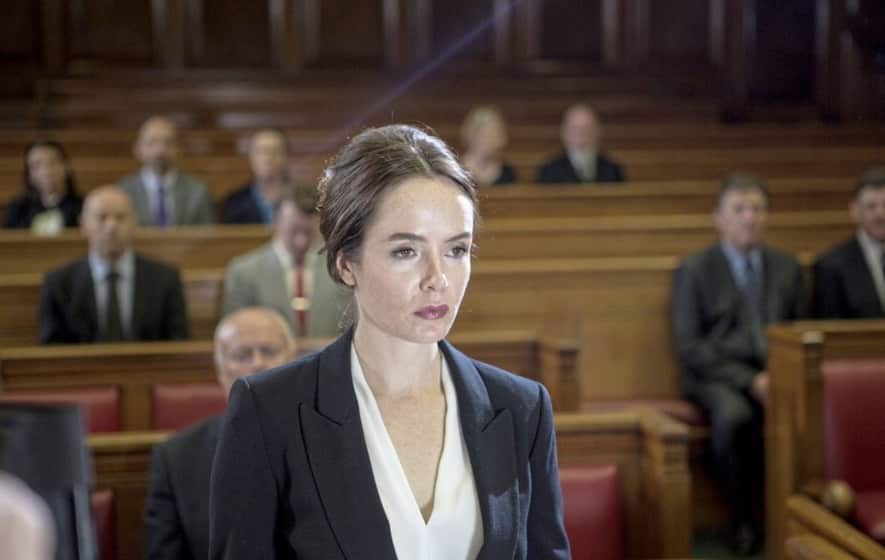
YOU could say Valene Kane is an actress prone to perilous situations – being kidnapped by a crazed Jamie Dornan in The Fall is only one of them – but in her latest role, the Newry-born star of Thirteen and Rogue One: A Star Wars Stor’, faces danger of a different kind.
In new BBC one-off drama Counsel, Kane steps into the killer heels of “alpha female” Olivia, a barrister who complicates her professional and personal life when persuaded to take on the case of a schoolboy client played by newcomer, Adam Gillian.
“On the surface, Olivia has it all: a powerful career and a husband [Declan Conlon] who is in the running for Lord Chief Justice – but she is growing tired of playing second fiddle…” teases the actress, speaking down the line from London where she lives with husband and fellow actor, Ed Cooper Clarke.
“When we meet Olivia, she’s sort of at a crossroads and doesn’t realise she is a little bit dead inside, so, when she meets this young boy, he ignites this free spirit inside her; a free spirit she didn’t realise existed.”
Valene Kane Is a Rising Star
The actress, who is currently filming HBO crime series Gangs of London and recently walked the red carpet at the Sundance Film Festival in the US – for the premiere of her latest movie, Sonja: The White Swan – was delighted to be back in Northern Ireland for the project, commissioned through the BBC’s New Perspectives initiative.
Penned by newcomer David Allen and directed by Declan Recks (The Truth Commissioner), Counsel showcases the emerging talent of Gillian as 18-year-old Gareth Fleming, a motherless young student whose educational future hangs in the balance after his father suffers a stroke and is unable to pay mounting school fees.
“It was so good to be back home again and involved in this project,” Kane enthuses. “Everyone working on the drama wants to see more work like this – we were so excited because we all grew up here and felt very connected, whether we come from Northern Ireland, or from the south.
“I’ve read a lot of scripts recently with good female leads, but not female-centric stories. Why I loved Olivia’s character in Counsel is essentially because it’s her story… it’s the confusion that a woman of a certain age faces when she hits a certain point in her life – her career’s going really well, but does she want kids? What’s next? Those questions relate to everyone, I think, and that’s what drew me to it.”
Describing herself as “a bit Type A personality, a bit of an alpha female” herself, the London Central School of Drama-trained daughter of former Down county Gaelic footballer and coach Val Kane says she understood that part of Olivia – even though she is “more disorganised, messy and bohemian” in real life.
But, understanding the role from the inside out is something the actress, who also starred in recent BBC drama Death and Nightingales – again with Jamie Dornan – takes completely to heart.
She makes ‘mood boards’, puts together Spotify playlists and keeps a scrapbook to help identify with her character long before the cameras start rolling.
“I use artistic mood boards for every character and I’ll keep a scrapbook with pictures and textures to help me feel what they feel,” Kane explains. “For the role of Olivia, I also worked very closely with the costume designer because I had a clear idea of how I thought she would dress and want she would want to wear.
“My father-in-law is a High Court judge and so I asked him lots of questions too… it’s a world I’m fascinated in anyway, the legal world. I think Counsel has great legs; it definitely has the potential to be made into a series.”
But even with such fastidious preparation, born out of love for the craft she has pursued since teenage years with the National Youth Theatre, the now 32-year-old is still reluctant to watch herself on screen.
“I find it very difficult, especially the stuff in which I have the lead in,” Kane reflects. “I find it hard not to critique myself and then I lose the enjoyment of just watching it. I usually get my husband to watch if first and then he tells me what he thinks…
“He’s more of a writer [than an actor] now, which is better for us, as he’s the person in one place, writing, and I’m the one who travels. It helps, I think, that we’re in the same profession, as he understands how I have to drop everything sometimes when an acting job comes up.”
Kane, who suddenly found herself reading for high profile roles following her compelling portrayal of Rose Stagg, the ex-girlfriend of serial killer Paul Spector (Dornan) in Allan Cubitt’s The Fall, is delighted that now her dream career – in defiance of the initial wishes of her parents who wanted her to attend university and study law for real – is taking off.
As well as Sonja: The White Swan – a film about Sonja Henie, Olympic figure skater and later Hollywood actress – Kane is also awaiting the general release on another movie, Profile, in which she plays a British journalist who dons a hijab to investigate the phenomenon of young women being radicalised online.
Based on the 2015 non-fiction bestseller, In The Skin of Jidhadist, by a French journalist who now has round-the-clock police protection, Profile won the Panorama Audience Award at the 68th Berlin International Film Festival and has been her “biggest highlight” thus far.
“It’s based on a true story about a journalist who had a fatwa out on her head after her story broke so, initially, my agents were kind of wary,” Kane tells me. “But, I trusted the director, the producer and in the whole process.
“We ended up writing a lot of the script together and it was a very involved process in the editing suite afterwards. It felt very much like a producer’s role – and that’s something I think I’m heading towards in the future.
“There was a long period when I was really struggling, so it’s great to be living in London and able to work there as well now on Gangs of London. It’s the first time in my 10 years of acting that I get to stay in my own house and go to my own bed. That makes me happy.”
The Second Coming – W.B. Yeats
Turning and turning in the widening gyre
The falcon cannot hear the falconer;
Things fall apart; the centre cannot hold;
Mere anarchy is loosed upon the world,
The blood-dimmed tide is loosed, and everywhere
The ceremony of innocence is drowned;
The best lack all conviction, while the worst
Are full of passionate intensity.
Surely some revelation is at hand;
Surely the Second Coming is at hand.
The Second Coming! Hardly are those words out
When a vast image out of Spiritus Mundi
Troubles my sight: somewhere in sands of the desert
A shape with lion body and the head of a man,
A gaze blank and pitiless as the sun,
Is moving its slow thighs, while all about it
Reel shadows of the indignant desert birds.
The darkness drops again; but now I know
That twenty centuries of stony sleep
Were vexed to nightmare by a rocking cradle,
And what rough beast, its hour come round at last,
Slouches towards Bethlehem to be born?
It’s apposite to our present age – though previous, and probably future generations thought the same. Surely Britain and Ireland, and more so, America are currently in a political and cultural turmoil, where those who screamed loudest for a return of ‘control’ have demonstrated their inability to exercise even self-control: the falcon cannot hear the falconer; the falconer has an agenda of his own, which bears little relationship to the needs of the masses.
No government has a concrete agenda to control global warming and no means to enforce one, were they to turn their minds to it.
What is the nature of that ‘rough beast’ slouching to Bethlehem to be born?
Who knows? But cataclysm is at hand.
The Quest… by Robert Service
I sought Him on the purple seas,
I sought Him on the peaks aflame:
Amid the gloom of giant trees
And canyons lone I called His name;
The wasted ways of earth I trod;
In vain; in vain! I found not God.
I sought Him in the hives of men,
The cities grand, the hamlets grey,
The temples old beyond my ken,
The tabernacles of today;
All life that is, from cloud to cloud
I sought … Alas! I found not God.
Then after roamings far and wide,
In streets and seas and deserts wild,
I came at last to stand beside
The death-bed of my little child,
Lo! As I bent beneath the rod
I raised my eyes … and there was God.
The photo above is of His Holiness the Pope, with Dr John McAreavey, then Bishop of Dromore – a man destroyed by Steven Nolan, may God forgive him.
